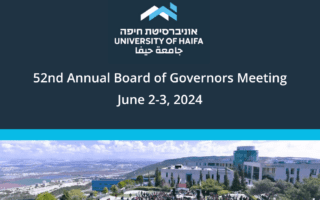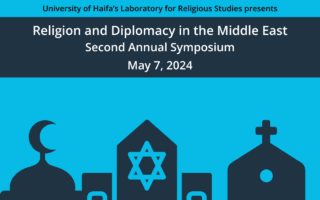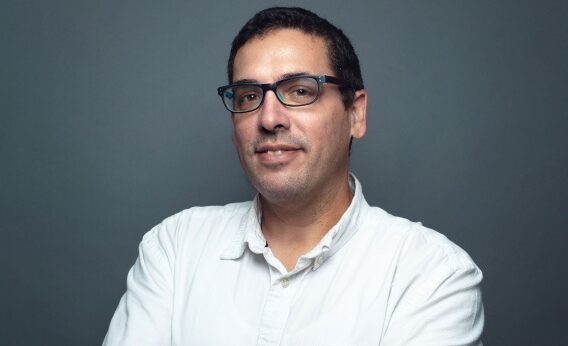By: Noa Amouyal Published: April 25, 2024
Many people around the world were captivated by the rapid-fire dialogue in Aaron Sorkin’s “The West Wing,” and Dr. Kobby Barda was no exception. Watching that iconic program inspired him to embark on a path of studying American politics.
Dr. Barda’s academic journey culminated in a PhD from University of Haifa last November. His dissertation, which covered the history and geostrategy of American political grassroots movements, has afforded him many opportunities, both professional and personal. He is already due to complete postdoctoral studies at the University next year.
Today, Dr. Barda also serves as Director of International Relations and Business Development at the Netanya Municipality, where he works to create incentives for external parties looking to create international partnerships with the city.
Dr. Barda sat down with American Society of the University of Haifa to talk about how the University has set him up for success, and why Jews in Israel must reach out to the Christian and Muslim faiths now more than ever.
What made you want to enroll in University of Haifa?
I was working as a spokesperson for Israel’s football league at the time and began to understand that this profession was dying because print media is on the decline. I saw a future where a decreasing demand for spokespeople seemed like a very possible reality. So, I thought about what other profession I’d enjoy, and I decided to do something I’ve wanted to do my whole life — study American politics. I’ve been an American politics junkie since I was six years old. “The West Wing,” “Primary Colors,” “The American President” — I loved them all. I would watch this content about American politics religiously, but when it came to actually learning about American politics, there were few options in Israeli academia. The one place where I found a unique path to studying American politics was through University of Haifa’s Ruderman Program for American Jewish studies. I thought, if I can’t walk through the door, I’ll slide in through the window. After all, there are so many ways American Jewry influences U.S. politics, so the Ruderman program was my gateway. There, I specifically wanted to learn about how grassroots movements influence American politics.
When I first interviewed with Prof. Gur Alroey [then head of the program, and now the University’s rector as well as its future President], I told him I was determined to obtain my PhD by the time I turned 50, and I was 43 at the time. Prof. Alroey did everything to make this goal possible for me and on November 6, I got my PhD. Next year, I plan to do a postdoc.
Can you talk about your current relationship with the University, particularly your role as a fellow at the University’s Laboratory for Religious Studies?
My dissertation was about the Evangelical religious movement in the United States, and exploring this world changed my life. At first, I thought religion was simply one way to look at grassroots movements. My expertise in this field prompted the Ministry of Tourism to offer me the role of deputy director-general because of my deep knowledge of the Evangelical world.
As a fellow at the University’s Lab, I was fortunate enough to receive a scholarship from Uriel Simonsohn twice, and I’ll be doing my postdoc with him next year. He and the entire University of Haifa family have been so generous to me — they’ve given me some 120,000 NIS ($32,000) in scholarships over the course of my time at the school. Prof. Eli Cook, for example, gave me 10,000 NIS ($2,700) to study the archives of religious movements in the United States. I’ve traveled to the United States three times thanks to University funding, and I doubt other schools are so giving.
As the Deputy Director of the Ministry of Tourism, what challenges did you encounter when trying to bring people to Israel?
I was there during the height of the COVID-19 crisis. Tourism across the world suddenly was jammed, and it was the first industry to suffer and the last to recover. We had to knock on doors all the time. For example, we flew to the Delta headquarters in Atlanta, and we convinced them with hard data about the importance of resuming their direct flight to Tel Aviv. It worked — that summer of August 2022, we had the top record of tourists entering from North America.
Additionally, it was very important to then-Tourism Minister Yoel Razvozov to open the cruise market in Israel. We worked with the Ministry of Interior Affairs to speed up the disembarking process when cruise ships dock in Haifa. We also found that the Rimon Airport in Eilat was underutilized, so we increased government subsidies for the city of Eilat and established direct flights to Eilat to help address that.
As head of the marketing department, I was responsible for drumming up faith-based travel to Israel, and we had big plans. For example, we worked with then-U.S. Ambassador Tom Nides to promote the idea of Egypt, Jordan and Israel creating a diving tourism attraction in the Gulf of Aqaba. October 7, obviously, derailed those plans.
Are you optimistic that we can resume these kinds of plans with Israel’s Arab neighbors in the future?
Yes. I believe we’ll still have a big deal with Saudi Arabia on the horizon. I also think our hostages will be returned. The way to make this happen is through what I call the Arab Charter — bringing together Saudi Arabia, Egypt and the United Arab Emirates to run civil life in Gaza, and Israel will conduct military raids as needed. I think that’s how we exit this war. We’re at a very crucial week right now and I think a program like this could be brought to life. Sometimes we are bogged down by little incidents that seem huge, but there are big overarching things that need to happen that can and should dwarf minor setbacks. This is an example of such — we must revive these plans.
For example, look at the Oslo Accords. Prime Minister Yitzchak Rabin was killed, but then Prime Minister Netanyahu still kept the agreement that was in place.
What about the future of faith-based travel?
When I was at the Ministry of Tourism, we wanted to bring back Jerry Falwell’s vision he had in 1971. He wanted to give students at Liberty University free trips to Israel, and 140 students came. Falwell had the secret sauce when it came to rallying up students investing in Church Planting, which is teaching Christians to create their own communities on a grassroots level. One of the most important pillars of Church Planting is a love of Israel. We must look into this. Today, Evangelicals have seen a dramatic drop in support for Israel, from 69% in 2018 to 33.6% in 2021. We in Israel have been asleep at the wheel and now we’re suffering in campuses across the United States. There are some 7,000 Church Planters in the U.S. at the moment who have the potential to reach 150,000 people. We must reach out to them.
Can you talk about your current role as the Business Development and Foreign Relations Director of the Netanya Municipality?
I work with the municipality’s Foreign Affairs division, and we’ve done some interesting things where I’m dedicated to convincing international corporations to set up shop in Netanya. Two weeks ago, we hosted a delegation from Tesla. Netanya already has offices for EBay, Cisco, Outbrain and L’oreal, and we want to grow. When Elon Musk was here, he promised Prime Minister Benjamin Netanyahu that he’d bring an AI campus to Israel, so perhaps having a small office in Netanya could be a gateway for that.
What was it about your time at Haifa that set you up for the success you enjoy today?
I earned my BA at the Academic College of Tel Aviv-Yaffo. They say the difference between a college and university is that a college is more personalized, and a university has more prestige. I was told there’s no sense of family at a university. I have to say at University of Haifa, it was far more intimate than a college. My ties with professors were very intense. They’re very accessible and generous with their budget and time. For Prof. Cook, for example, to give me 10,000 NIS out of his budget, was not something every mentor would do.
Some of my friends have PhDs from other universities, and they have to do so much in order to secure a mentor. At University of Haifa, they set you up for success, obtaining scholarships and guidance, and you’re able to get a very personalized experience.
I know my experience is not unique. Since I started at the school, I’ve recruited some 15 people for the Ruderman Program. None of them said they didn’t value their time there, so I know my experience doesn’t only apply to me, it’s the reality.



